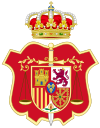President of the Supreme Court of Spain
| President of the Supreme Court and the General Council of the Judiciary |
|
|---|---|

Coat of Arms of the
General Council of the Judiciary |
|
| Member of | Supreme Court and General Council of the Judiciary |
| Seat | Salesas Reales Convent, |
| Nominator | General Council of the Judiciary |
| Appointer | King of Spain |
| Term length | 5 years, 2 terms limit |
| Constituting instrument | Constitution of 1978 |
| Formation | 1812 (Supreme Court) 1978(General Council of the Judiciary) |
| First holder | Ramón Posada y Soto |
| Unofficial names | Chief of the Judiciary |
| Deputy | Vicepresident of the Supreme Court and of the General Council of the Judiciary |
| Salary | 131.454,38 € |
| Website | poderjudicial.es |
The President of the Supreme Court and also President of the General Council of the Judiciary, is the first judicial authority of the Nation and holds the representation of the Judicial Power and its governing body (CGPJ), corresponding to the treatment and honors inherent to that condition.
The current holder of the office is Carlos Lesmes Serrano since 2013.
According to Article 598 of the Organic Law of the Judiciary, the President is entitled to:
According to article 589, it also corresponds to the President:
From the President of the Supreme Court depends on the Cabinet of the Presidency, headed by a Cabinet Director who chairs the incumbent President, will exercise others duties that the President entrusts him and directs the Services of Secretariat of Presidency, both the Supreme Court and the General Council Of the Judicial Branch.
In accordance with the provisions of Article 586 of the Organic Law of the Judiciary, to be elected President of the Supreme Court and the General Council of the Judiciary:
«It will be necessary to be a member of the judicial profession with the category of Magistrate of the Supreme Court and to meet the conditions required to be President of Chamber of the same, or to be a jurist of recognized competence with more than twenty-five years of seniority in the exercise of his profession.»
The President is elected in the Plenary of the Council if he has obtained the confidence of three fifths of the members of the Plenary. If this was not the case, a second ballot would be held between the two candidates most voted in the first ballot, and the one who obtained the most support would be elected President. Once elected, the election will be communicated to the King who will definitely appoint him to be President. Subsequently, this will end the inauguration with an oath before the monarch.
Pursuant to article 588 of the Organic Law of the Judiciary, the President of the Supreme Court and the General Council of the Judiciary shall cease for the following reasons:
Since 1812 there have been numerous presidents of the Supreme Court, however, the General Council of the Judiciary is relatively younger. This is the list of presidents who have had the Council since the foundation and who also have been presidents of the Supreme Court:
...
Wikipedia

